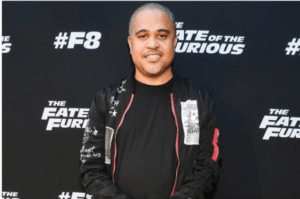George Johnson, Johnson Products
He was born in Mississippi on June 16th, 1927, George Ellis Johnson moved to Chicago with his mother and brother in 1929. As a boy, George shined shoes, then dropped out of high school and worked odd jobs to help support his family.
In 1944, he joined his older brother at Fuller Products, a cosmetics company founded by Samuel B. Fuller. Fuller, who would become the richest black American of the 1950s, inspired his employees with sayings like, “take what you have and make what you want”.
Johnson quickly mastered door-to-door sales, then joined Fuller’s laboratory staff, where he learned how to make lipstick, foundation and cologne. By 1953, George had risen to head production chemist and was married with two children.

That same year he met a celebrity stylist, who needed a product that would straighten his client’s hair without burning their scalp. With Samuel Fuller’s blessing, George created a gentle hair relaxer for black men at the Fuller labs, then approached his bank for a $250 business loan to market his “Ultra Wave Hair Culture”.
He was denied.
Undeterred, he reapplied and asked for the same amount. This time, however, he said the money was for a vacation and the loan was approved.
In 1954, with S.B. Fuller’s blessing, George left his job and founded the Johnson Products Company at age 26.
Ultra Wave was an immediate success, but it was eclipsed three years later, when the company released Ultra Sheen, a revolutionary hair straightener for black women that could be applied at home.
George Johnson, Johnson Products
Johnson Products grew rapidly, moving from the second floor of a South Side warehouse to its own three-story building. By 1964, the company was generating $1 million [“one million dollars”] in revenue and the release of its “Afro Sheen” line would take Johnson Products to new heights, enabling George to found Independence Bank, which would eventually grow into the nation’s largest black-owned bank.
Sales reached $12 million in 1970 and in 1971, Johnson Products became the first black-owned corporation to trade on the American Stock Exchange.
Mr. Johnson’s principal sponsorship and television advertising on the long-running dance show “Soul Train” garnered even more popularity for Johnson Products and by 1975 the company was generating revenue in excess of $37 million.
At its peak, Johnson Products Company was the largest black-owned corporation in the United States, with over 230 employees and markets in Africa, the West Indies, and Latin America.































